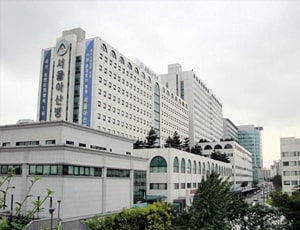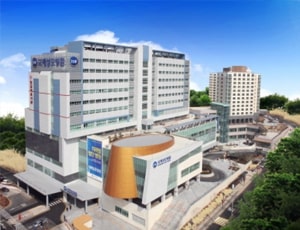The average cost of Colorectal Cancer ( Colon Cancer ) Treatment in Seoul approximately starts from USD 30000
Treatment cost

Asan Medical Centre located in Seoul, South Korea is accredited by ISO. Also listed below are some of the most prominent infrastructural details:


International St. Mary's Hospital located in Seoul, South Korea is accredited by JCI. Also listed below are some of the most prominent infrastructural details:
Colon Cancer is the abnormal growth of the cells in the inner lining of the colon part of the large intestine also known as bowel cancer, colon cancer, or rectal cancer. This abnormal growth is called a polyp.
Colorectal cancer can affect men and women equally. However, studies have proven that men might develop it at a younger age.
There is no definite cause of colorectal cancer, but old age and certain lifestyle factors can increase colorectal cancer risk. Some of these colorectal cancer risk factors include the following:
A majority of colorectal cancers are adenocarcinoma. If you have been diagnosed with colorectal cancer, there are 95 percent chance that it is an adenocarcinoma. But there are some other types of colorectal cancer such as:
The doctor selects the most appropriate course of treatment for the patient after assessing the stage. Every patient has a customized treatment plan that is designed to best address their unique needs. The following options could be part of the treatment strategy.
Different types of surgery options can be used as per the identified stage of colorectal cancer. Surgery can be divided into two major segments: Early-stage colorectal cancer surgery and advanced-stage colorectal cancer surgery.
Early-stage colorectal cancer surgery: This is a minimally invasive form of surgery, which is typically recommended when the cancer is small and has not spread to other parts of the body. Early stage colorectal cancer surgery includes the following procedures:
This is a more invasive surgical option, recommended when cancer has grown into or through your colon. It can be of the following types:
In chemotherapy treatment, an anti-cancer drug is used to destroy the cancerous cells. It is commonly used before surgery, in an attempt to shrink a tumor before its surgical removal. It can also be given to relieve symptoms of colon cancer, in case it has spread to other parts of the body.
A certain number of chemotherapy cycles are also repeated after the surgery to kill the remaining cancer cells. This helps minimize the chances of cancer recurrence.
In this treatment, radiation beams such as X-ray or proton beams are used to kill cancer cells. It also prevents cancer cells from multiplying any further. This treatment is more commonly used for rectal cancer treatment before surgery to shrink the tumor. It can also be used after the surgery. Radiation therapy is the best treatment if cancer has penetrated through the wall of the rectum or traveled to nearby lymph nodes.
Targeted drug therapy is typically used for people with advanced colon cancer. It can be given alone or in combination with chemotherapy. Specific drugs help cancer cells commit suicide and strengthen the immune system. However, this treatment comes with limited benefits and risk of side effects.
Patients undergoing the surgery are required to stay in the hospital for at least two to three days after the surgery. You may expect yourself to be discharged from the hospital after regaining bowel function and the ability to eat without the support of an IV. Pain is controlled with the help of medications and it may take another two to three weeks at home before you can switch back to your normal routine.
If the Patient had surgery for the removal of bowel cancer, it may take a few weeks before you can return to work. In the case of laparoscopic surgery, you can return to work in about two weeks. In the case of open surgery, it may take around four to six weeks for you to return to work.
Patients must pay particular attention to eating the right food and avoid dehydration after bowel cancer surgery. Include high-protein foods in your diet and choose low-fiber foods if you have diarrhea. Additionally, eat limited amounts of green vegetables and only eat peeled fruits.
Patients who undergo chemotherapy before or after the surgery may experience a few side effects such as nausea, vomiting, fatigue, and pint pain. Make sure to drink plenty of fluids to minimize the side effects and recover quickly. Take emergency medications prescribed by the doctor, if needed.
Ask your healthcare adviser for the best multiple options and choose the one that meets your expectations
The cost of Colorectal Cancer ( Colon Cancer ) Treatment in Seoul starts from $30000. Colorectal Cancer ( Colon Cancer ) Treatment in Seoul is conducted across several KOIHA certified hospitals.
Colorectal Cancer ( Colon Cancer ) Treatment package cost in Seoul has different inclusions and exclusions. The top hospitals for Colorectal Cancer ( Colon Cancer ) Treatment in Seoul covers all the expenses related to the pre-surgery investigations of the candidate. The Colorectal Cancer ( Colon Cancer ) Treatment package in Seoul includes the fees of the surgeon, hospitalization and anesthesia as well. There are many things that may increase the cost of Colorectal Cancer ( Colon Cancer ) Treatment in Seoul, including prolonged hospital stay and complications after the procedure.
There are many hospitals across the country that offer Colorectal Cancer ( Colon Cancer ) Treatment to international patients. For quick reference, the following are some of the leading hospitals for Colorectal Cancer ( Colon Cancer ) Treatment in Seoul:
The recovery of the patient many vary, depending on several factors. However, on an average, patient is supposed to stay for about 26 days in the country after discharge. This time frame is important to ensure that the surgery was successful and the patient is fit to fly back.
Apart from the Colorectal Cancer ( Colon Cancer ) Treatment cost, there are a few other daily charges that the patient may have to pay. These charges may vary from 40 USD per person.
The patient has to spend about 4 Days in the hospital after Colorectal Cancer ( Colon Cancer ) Treatment for proper recovery and to get clearance for discharge. During the recovery, the patient is carefully monitored and control tests are performed to see that everything is okay. If required, physiotherapy sessions are also planned during recovery in hospital.
There are about 2 Hospitals in Seoul that offer Colorectal Cancer ( Colon Cancer ) Treatment to international patients. These hospitals have propoer infrastructure as well as offer good quality of services when it comes to Colorectal Cancer ( Colon Cancer ) Treatment surgery. Also, these hospitals follow the necessary guidelines as required by the medical associations for the treatment of Colorectal Cancer ( Colon Cancer ) Treatment patients.
Some of the most sought after doctors for Colorectal Cancer ( Colon Cancer ) Treatment in Seoul are:
One of the most popular destinations for medical tourism in the world, Seoul, the capital of South Korea attracts around 60% of the patients traveling to the country for quality care. More than 2.76 million International patients travel to South Korea on average. This can be attributed to high-quality medical services, economical healthcare services, and affordable packages that combine both treatment and relaxation. The number of healthcare organizations in Seoul tally up to 21,507. Out of these, 14 are advanced hospitals that provide a range of healthcare services. The high success rate of cancer treatment, plastic surgery, and organ transplants attract the majority of foreign patients to Seoul. Hundreds and thousands of patients from abroad travel to Seoul for cosmetic and plastic surgery. The largest proportion of medical tourists belonged to China and the United States. The top hospitals in Seoul have well-trained medical staff along with coordinators that help international patients availing treatments without any issues.
Seoul has a wide network of internationally accredited hospitals that are using cutting-edge medical technology to treat patients. Some of the top hospitals in Seoul are:
The doctors in Seoul obtained their medical education and training from some of the most reputed medical institutions around the world. Some of the top doctors in Seoul are:
Seoul is a major healthcare center and is well connected to the major cities in the globe via air. You can reach the city by international flights. If you are planning to travel, then we can assist you in making the journey hassle-free.